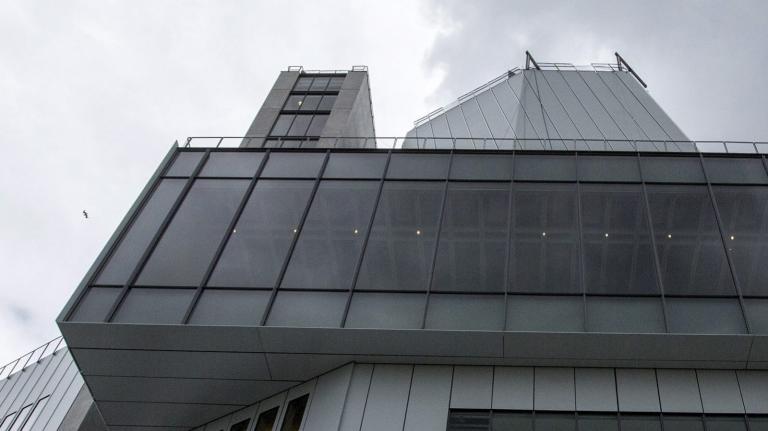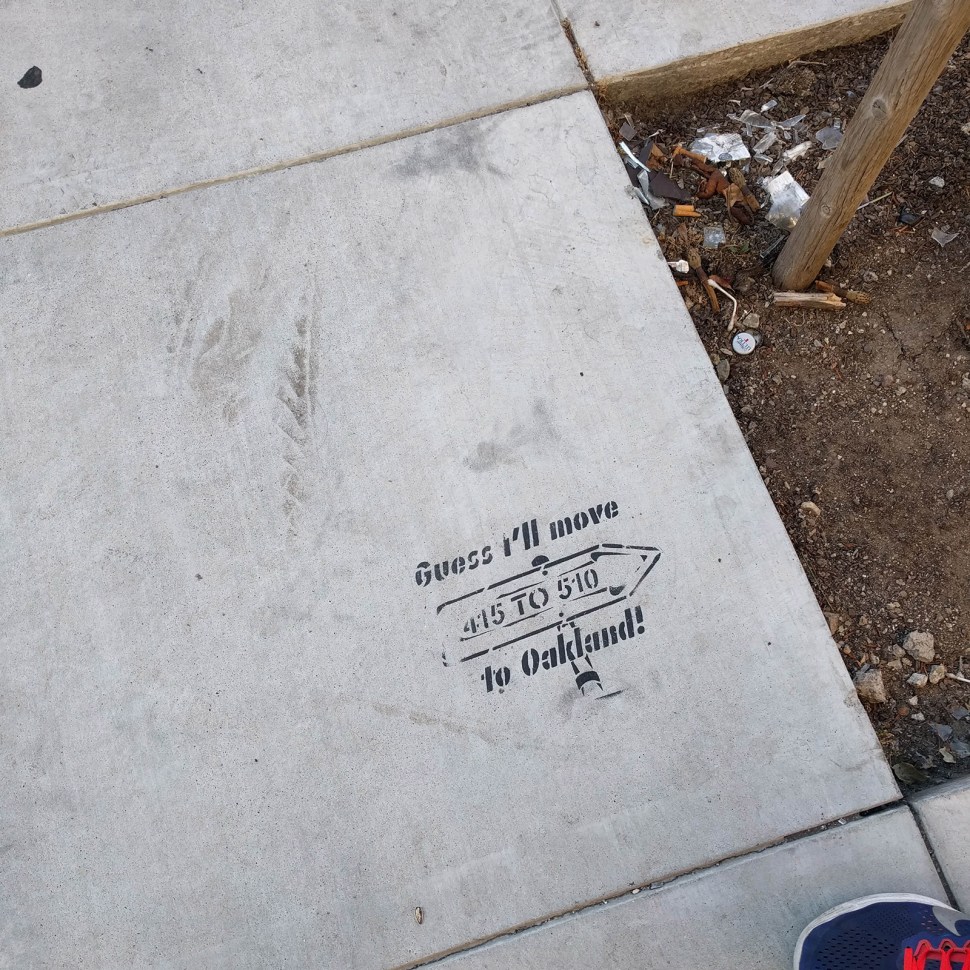This was at least the eighth time that Scott Wiener sat through the same PowerPoint presentation, and he was beginning to wonder what the heck was going on. It was 2009, and Wiener was an environmentalist and LGBT-rights activist who had become president of his neighborhood association in San Francisco’s Castro district. Developers were presenting plans for a bunch of apartments atop a Whole Foods — and it seemed like a good idea to Wiener. The development would replace a vacant Ford showroom, it was on a transit line, and it would be designed by deep-green architect William McDonough+Partners.
But before they could build, they had to have meetings — so many meetings!
Even though this project complied with all local zoning codes, city officials had scheduled some 50 meetings to solicit community feedback, Wiener said. It seemed like a system designed to stop developers from building housing. This, he thought, had to be bad for the environment.
Environmentalists are usually thought of as folks who are trying to stop something: a destructive dam, an oil export terminal, a risky pipeline. But when it comes to housing, new-school environmentalists — like Wiener — understand that it’s necessary to support things, too. To meet California’s ambitious goals to cut pollution and greenhouse gas emissions, regulators say the state must build dense, walkable neighborhoods that allow people to ditch their cars.
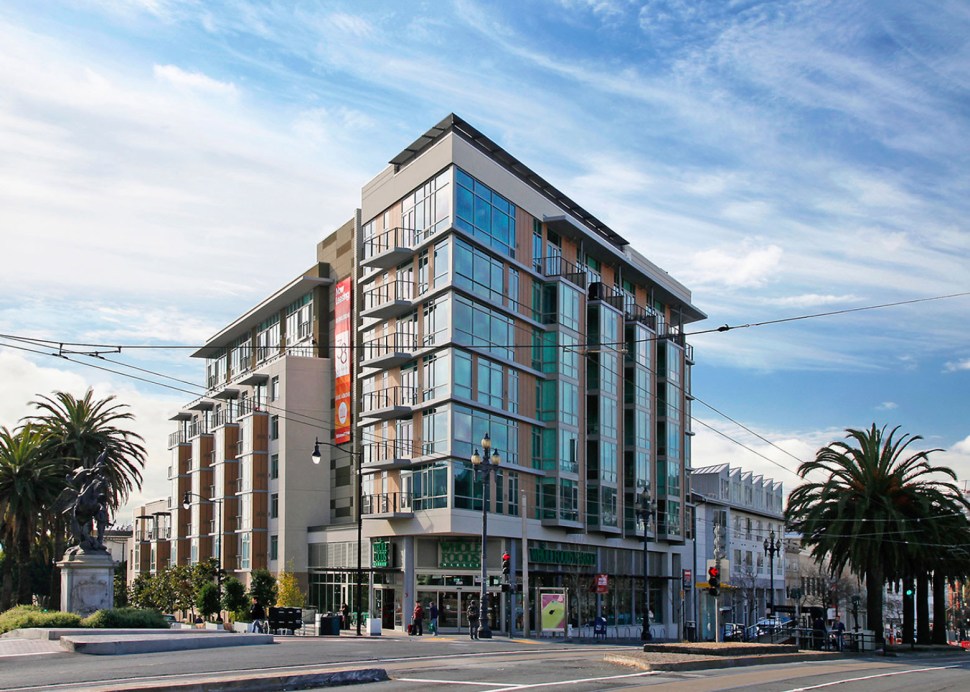
The apartments over a Whole Foods eventually made it through the process and were built. Prado Group
If you slow down development in cities, houses will sprawl out over farmland, and people will wind up making longer commutes. “You can’t legitimately call yourself an environmentalist,” Wiener says, “unless you support dense housing in walkable neighborhoods with public transportation.”
Wiener decided to get involved in his neighborhood’s development issues, and he got elected to office — first as a San Francisco supervisor, then as a state senator. He’s made it a top priority to ditch all of those redundant meetings and clear away red tape for responsible housing development in cities. This year, he introduced a bill in the California state assembly that served as the lynch-pin in a historic package of 15 new laws aimed at spurring new housing, which San Francisco and other parts of the state desperately need.
All of this makes Wiener perhaps the most powerful voice in the YIMBY — yes, in my backyard! — movement. The YIMBYs are mostly millennials who, angered by the urban housing shortage, have begun demanding a building boom to put roofs over heads, get people out of cars, drive down rents, and stop sprawl.
But the idea that profit-driven builders could provide equitable, environmentally friendly housing sounds like a joke to much of San Francisco’s progressive establishment. The arguments against new, dense development are familiar: homeowners talk about the “character of their neighborhoods,” renters fear losing rent-controlled units. For decades, developers have been the bad guys. Now they’ve got some degree of public support on their side.
“The YIMBYs have pretty much been a Trojan horse for developers,” says Chris Carlsson, a cycling advocate and author in San Francisco.
And it’s not just in the Bay Area. Seems like everywhere across the country where there’s a housing shortage, you’ll find YIMBYs or like-minded advocates for denser development. The result: new partisans within the green movement sparring over policy and throwing more shade than a 50-story tower.
When Wiener got elected to San Francisco’s city hall as a supervisor in 2010, environmental activists would shout at him as he walked through the halls. “There was a lot of opposition to every conceivable housing proposal,” he remembers, “and not a lot of support — other than from the developers.”
Then Sonja Trauss started showing up.
An environmentalist from Philadelphia, Trauss grew up “aggressively committed to biking and walking,” because she didn’t want to be part of the climate problem. “I felt very resentful that people would design cities that required people to buy a car,” she says.
When she moved to San Francisco in 2011, she was shocked to see the local chapter of the Sierra Club opposing development. No matter the proposal — for affordable housing, or a luxury tower — there was always some ostensibly green organization ready to argue that it was fatally flawed. As thwarted projects piled up, something snapped inside her.
“I said, ‘Fuck you guys, I know what you are doing. You are making signs, I can make signs. You are writing letters? We can write letters.’”
She started urging people to join her at planning commission hearings. Anyone who had complained about NIMBYs on Facebook, over beers, or in the comments section of blog posts made her invite list. She made a Google group to keep the conversation going online. It was a snarky, profane community where social justice advocates and libertarians argued, found common ground, and trolled anyone opposed to new housing.
The chaotic nature of the group suited Trauss, who considers herself an anarchist. In a devil-may-care gesture, she named the group the San Francisco Bay Area Renters Federation — SF BARF.
Other YIMBY clubs sprang up (there are now 10 around the Bay Area) — although none had quite as provocative a name. Trauss, like a good anarchist, encouraged them all. “There’s tons of crazy people against development. I wanted to get a bunch of crazy people for development.”
These YIMBYs were a godsend for Wiener. He was no longer in the uncomfortable position of voting against all the community members that came to hearings. “These young, hip millennials were showing up and saying, ‘Hey, I’m a renter, and I want to know what my future is in this city,’” Wiener recalls. “‘Why are we making it so hard to build housing?’”
Unlike the buttoned-up businessmen who had spoken for developments in the past, these YIMBYs made their points forcefully. They could be funny, passionate, and a little unhinged. Trauss showed up for a debate on television wearing a Batman T-shirt.
“I’m really upset by some of the things that were said up here,” one YIMBY stalwart, Laura Foote Clark, ranted at a hearing. “My entire generation has been stunted by a housing shortage brought on by people who can’t stand to have apartment buildings in their neighborhoods.”
When Wiener ran for the California Senate last year, the YIMBYs were squarely behind him. They had more than 200 volunteers knocking on doors, and many more skirmishing on social media. Wiener never missed an opportunity to point out that he had voted for controversial measures to build more housing, which his opponent, Jane Kim, had fought.
It seemed like a risky move, but polls suggested the tactic was sound, he says. “The voters were ahead of the politicians in understanding that we need to have more housing.” (Kim’s office did not respond to an interview request.)
In December, on his first day in the Senate, Wiener introduced a housing bill aimed at fast-tracking developments in that meet zoning regulations in housing-strapped cities. It essentially stripped away the kind of meetings that Wiener had to sit through as a community activist.
To win support, he bargained with labor and environmental groups. The former wanted tweaks to require builders to hire a union workforce, the latter wanted revisions to prevent sprawl and protect prime farmland, wetlands, and coastal areas.
With those amendments, the California League of Conservation Voters and Natural Resources Defense Council both ultimately threw their weight behind Wiener’s measure. The California Sierra Club remained opposed, but “they never went to war,” he says. “They could have made things a lot harder.”
Still, the proposal had powerful opponents, including a powerful committee leader. Five months after Wiener had proposed the bill, it appeared to be stuck in legislative purgatory. “We just have to keep it going,” Wiener told staffers. “Our job is to keep this bill alive and intact until the cavalry arrives.”
As strange as San Francisco’s breed of anarchist-inspired YIMBYs might have seemed to traditional progressives, they’re part of a national trend, as millennial environmentalists embrace a different shade of green from their predecessors. They’re focused on social justice and looming global peril, not on saving beautiful places and individual species.
Carol Galante, a housing policy professor at the University of California, Berkeley, says many environmental groups have started to advocate for housing, reflecting this generational change.
“I see a huge shift happening,” she says.
The Sierra Club straddles that shift, with chapters on opposing sides. Sierra Magazine published an admiring article on the YIMBY movement earlier this year, and the group’s Seattle chapter is led by supporters of denser housing.
But the Bay Area chapter has clashed repeatedly with YIMBYs over both individual projects and big-picture policies. Last year, YIMBYs unsuccessfully tried to shift the chapter’s stance by joining en masse. This April, around the time that Wiener’s bill was beginning to hit opposition in legislative committees, a YIMBY journalist went to a Sierra Club meeting and wrote about members planning to use environmental laws to prevent housing from replacing a car repair shop.
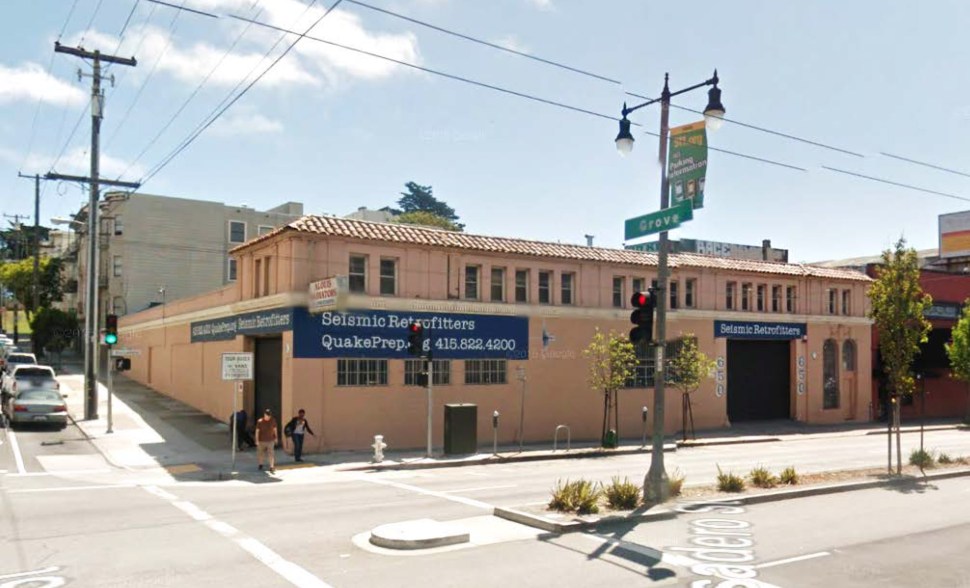
The car repair garage. commissions.sfplanning.org
The article garnered attention, and lots of people started pinging the California state lobbying arm of the Sierra Club to ask why they were fighting on the side of cars instead of urban housing.
After reading a series of critical tweets, the director of Sierra Club California, Kathryn Phillips, emailed the leaders of the San Francisco chapter to say that, even if the story was wrong, the chapter should correct the perception that it was using environmental protection rules to stop housing.
“Public perception and political optics right now are not good,” she wrote.
The Bay Area chapter declined my interview request, but leaders sent me a statement agreeing that more affordable housing in urban areas is good for the environment “as long as the ‘solutions’ don’t sell out values that are key to building a sustainable and equitable Bay Area — for example, by breaking urban limit lines, increasing reliance on cars, or prioritizing luxury development over affordable housing.”
But in San Francisco, all market-rate housing must sell at luxury prices to make a profit. The land itself, the community planning process, and the environmental reviews are staggeringly expensive. One new government-subsidized housing project in San Francisco cost $600,000 per apartment to build.
When environmentalists only support housing that offers below-market rents, they’re essentially opposing all private development. Some greens promote creative ideas for land trusts, government-backed co-ops, and other “anti-capitalist” options, as Miguel Robles-Durán, a Parsons School of Design professor, calls them, but experts don’t see those working in the United States anytime soon.
As UCLA planning professor Michael Lens puts it: “You could say we need to blow up the system, but it doesn’t strike me as being particularly realistic. I think the YIMBY movement is right to work within that system and work with developers.”
If the solution is to wait for the government to make affordable housing a priority, hardly anything will get built, argues Argues Brian Hanlon, a car-hating, vegetarian YIMBY: “It’s this idiotic thinking where the environment you are trying to protect gets worse and worse because you are waiting for some perfect solution to be delivered from God or the revolution or something. It’s monstrously unethical.”
When Wiener’s bill stalled in committee this spring, the YIMBYs kept up their support, but it was California Governor Jerry Brown who broke the stalemate in July, threatening to veto other housing bills supported by lawmakers without something similar to Wiener’s fast-track proposal.
The YIMBYs also lobbied for a tax on real estate sales and a $4-billion bond to pay for more affordable housing. Then there was the most audacious bill of them all — a measure to help YIMBYs and developers sue cities that blocked housing projects.
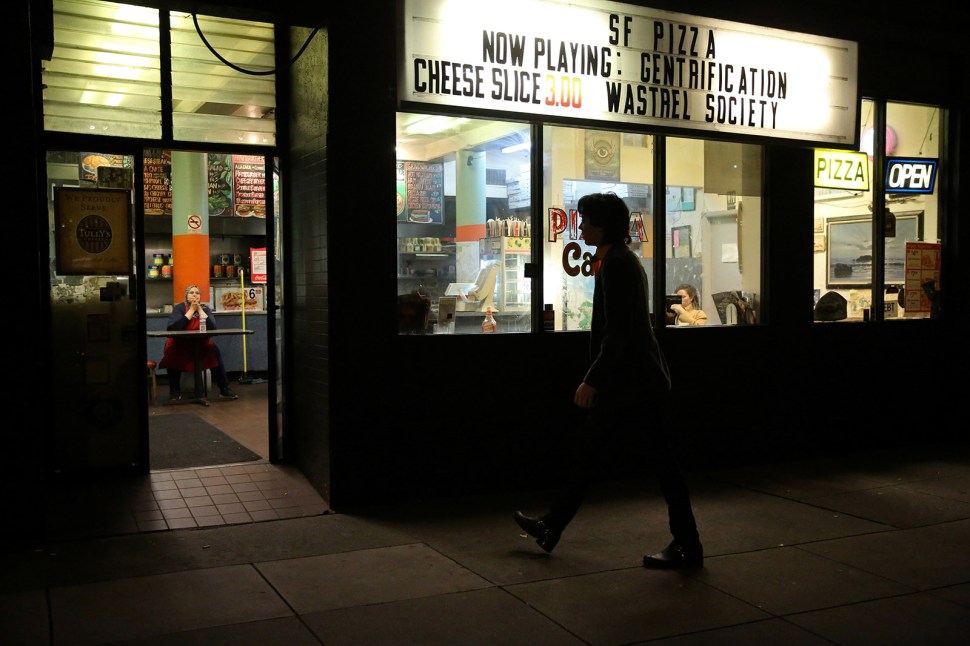
Zander Dejah, 25, a Virtual Reality engineer who lives at the Negev tech house, walks into SF Pizza to get some food on the way home from a bar in San Francisco. REUTERS / Gabrielle Lurie
All of this, they hoped, would lead to a boom in urban housing, lower prices, and, eventually, less pollution. Wiener built green cred by working on other environmental bills as well, including measures to boost solar power, water conservation, and recycling (just to name a few).
After negotiations with the governor, legislators realized they needed Wiener’s bill to pass the housing package. On Sept. 14, Clark and several other YIMBYs were drinking in San Francisco’s Mission when word arrived that lawmakers were tussling over the housing measures late into the night.
“We pulled out our laptops and set up a mini war room right there in the bar,” says Hanlon, the car-hating vegetarian. The YIMBYs started emailing their compatriots, asking them to call or contact their legislators on social media. Around 11 p.m., one affordable housing bill after another passed, and the bar erupted in cheers.
Brown brought politicians from around the state to San Francisco to sign the bills into law on Sept. 29. Weiner made a speech, proclaiming: “Today, California begins a pivot — a pivot from a housing-last policy to a housing first policy.”
Is YIMBYism the future of environmentalism? Most researchers I talked to said the pro-housing activists are good for the environment, because they push cities to become denser and more transit-friendly. But not always.
Christine Johnson, the San Francisco director of the urbanism think tank SPUR, applauded YIMBYs for making NIMBYism less attractive, for changing the political conversation, and for fighting single-family zoning, which causes the most environmentally destructive sprawl. But she cautions that there’s a small segment of YIMBYs who embrace any form of housing, including sprawl.
“To really get to a new form of equitable environmentalism, YIMBYs need to take a step further,” she says. “I think they will get there. They aren’t there yet.”
That means taking a strong stand for policies that encourage modest and efficient living in cities, rather than luxury blight. YIMBYs could fight for limits on apartment sizes, Johnson suggests, so that more people can share each new development, and could also campaign for the regional transit lines needed to make dense cities work.
There’s also concern about the movement getting co-opted by developers, who definitely aren’t saints. As Clark started working full time as an activist, for instance, her group YIMBY Action started taking money from developers ($5,000 last year from a building PAC) and tech companies. But the majority of her funding still comes from individuals.
And she’s still not doing it for the money, she says. “There is no amount of money that could make me go to these hearings,” she laughs. “Caring is the worst.”
At least one point is beyond dispute: Californians need more places to live. Housing costs are the main reason that California has the highest poverty rate of any state, worse than Alabama and Mississippi. And California keeps building sprawling subdivisions. Pushing poor people away from the coasts to hot inland suburbs — where they have to run air conditioners and spend hours each day in cars — is terrible for the environment.
The housing crisis is what gives YIMBYs their power. Organizing offers people an outlet for their frustration and an opportunity to influence housing policy on a local level. Advocates can show up at a planning commission, join an online group, write letters to politicians, and knock on doors before local elections.
YIMBYs are making a difference, says Berkeley’s Galante. “They are really driving to get localities to approve new housing across the income spectrum — places with good transit and jobs.”
Now, with the passage of California’s big housing package, they’ve played a crucial role in changing the rules of the game. The new laws will provide more than $1 billion a year to build affordable housing, while eliminating some of the barriers that NIMBYs use to stop new buildings.
There are YIMBY clubs popping up all over the country and around the world.
After last year’s election, Clark went to Wiener’s apartment to interview him for the YIMBY podcast, Infill, which she, Trauss, and Hanlon started last year. His home was tiny and — she whispers — “kind of crappy.” They were both exhausted. After Donald Trump’s election, it felt like the world might crumble around her.
But she also felt like she had just made the world a little better by getting a YIMBY elected to state office. Clark has spent a lot of her life feeling powerless, she said, a sentiment she thinks many young people share. “Especially for millennials — a lot of them landed out of college, and there just wasn’t anything there for them,” she says. “You feel like you’re a bag of shit and a waste of space.
“To be part of something that’s bigger than yourself, and to actually be able to move it forward, is a very uplifting feeling. It feels like it’s not about me. It’s about what we can accomplish together.”
